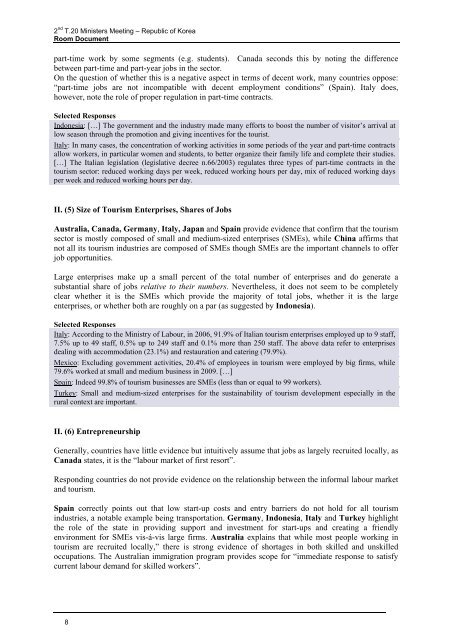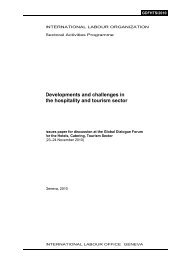Questionnaire on Tourism and Employment: Overview of Results
Questionnaire on Tourism and Employment: Overview of Results
Questionnaire on Tourism and Employment: Overview of Results
Create successful ePaper yourself
Turn your PDF publications into a flip-book with our unique Google optimized e-Paper software.
2 nd T.20 Ministers Meeting – Republic <strong>of</strong> Korea<br />
Room Document<br />
part-time work by some segments (e.g. students). Canada sec<strong>on</strong>ds this by noting the difference<br />
between part-time <strong>and</strong> part-year jobs in the sector.<br />
On the questi<strong>on</strong> <strong>of</strong> whether this is a negative aspect in terms <strong>of</strong> decent work, many countries oppose:<br />
“part-time jobs are not incompatible with decent employment c<strong>on</strong>diti<strong>on</strong>s” (Spain). Italy does,<br />
however, note the role <strong>of</strong> proper regulati<strong>on</strong> in part-time c<strong>on</strong>tracts.<br />
Selected Resp<strong>on</strong>ses<br />
Ind<strong>on</strong>esia: […] The government <strong>and</strong> the industry made many efforts to boost the number <strong>of</strong> visitor’s arrival at<br />
low seas<strong>on</strong> through the promoti<strong>on</strong> <strong>and</strong> giving incentives for the tourist.<br />
Italy: In many cases, the c<strong>on</strong>centrati<strong>on</strong> <strong>of</strong> working activities in some periods <strong>of</strong> the year <strong>and</strong> part-time c<strong>on</strong>tracts<br />
allow workers, in particular women <strong>and</strong> students, to better organize their family life <strong>and</strong> complete their studies.<br />
[…] The Italian legislati<strong>on</strong> (legislative decree n.66/2003) regulates three types <strong>of</strong> part-time c<strong>on</strong>tracts in the<br />
tourism sector: reduced working days per week, reduced working hours per day, mix <strong>of</strong> reduced working days<br />
per week <strong>and</strong> reduced working hours per day.<br />
II. (5) Size <strong>of</strong> <strong>Tourism</strong> Enterprises, Shares <strong>of</strong> Jobs<br />
Australia, Canada, Germany, Italy, Japan <strong>and</strong> Spain provide evidence that c<strong>on</strong>firm that the tourism<br />
sector is mostly composed <strong>of</strong> small <strong>and</strong> medium-sized enterprises (SMEs), while China affirms that<br />
not all its tourism industries are composed <strong>of</strong> SMEs though SMEs are the important channels to <strong>of</strong>fer<br />
job opportunities.<br />
Large enterprises make up a small percent <strong>of</strong> the total number <strong>of</strong> enterprises <strong>and</strong> do generate a<br />
substantial share <strong>of</strong> jobs relative to their numbers. Nevertheless, it does not seem to be completely<br />
clear whether it is the SMEs which provide the majority <strong>of</strong> total jobs, whether it is the large<br />
enterprises, or whether both are roughly <strong>on</strong> a par (as suggested by Ind<strong>on</strong>esia).<br />
Selected Resp<strong>on</strong>ses<br />
Italy: According to the Ministry <strong>of</strong> Labour, in 2006, 91.9% <strong>of</strong> Italian tourism enterprises employed up to 9 staff,<br />
7.5% up to 49 staff, 0.5% up to 249 staff <strong>and</strong> 0.1% more than 250 staff. The above data refer to enterprises<br />
dealing with accommodati<strong>on</strong> (23.1%) <strong>and</strong> restaurati<strong>on</strong> <strong>and</strong> catering (79.9%).<br />
Mexico: Excluding government activities, 20.4% <strong>of</strong> employees in tourism were employed by big firms, while<br />
79.6% worked at small <strong>and</strong> medium business in 2009. […]<br />
Spain: Indeed 99.8% <strong>of</strong> tourism businesses are SMEs (less than or equal to 99 workers).<br />
Turkey: Small <strong>and</strong> medium-sized enterprises for the sustainability <strong>of</strong> tourism development especially in the<br />
rural c<strong>on</strong>text are important.<br />
II. (6) Entrepreneurship<br />
Generally, countries have little evidence but intuitively assume that jobs as largely recruited locally, as<br />
Canada states, it is the “labour market <strong>of</strong> first resort”.<br />
Resp<strong>on</strong>ding countries do not provide evidence <strong>on</strong> the relati<strong>on</strong>ship between the informal labour market<br />
<strong>and</strong> tourism.<br />
Spain correctly points out that low start-up costs <strong>and</strong> entry barriers do not hold for all tourism<br />
industries, a notable example being transportati<strong>on</strong>. Germany, Ind<strong>on</strong>esia, Italy <strong>and</strong> Turkey highlight<br />
the role <strong>of</strong> the state in providing support <strong>and</strong> investment for start-ups <strong>and</strong> creating a friendly<br />
envir<strong>on</strong>ment for SMEs vis-á-vis large firms. Australia explains that while most people working in<br />
tourism are recruited locally,” there is str<strong>on</strong>g evidence <strong>of</strong> shortages in both skilled <strong>and</strong> unskilled<br />
occupati<strong>on</strong>s. The Australian immigrati<strong>on</strong> program provides scope for “immediate resp<strong>on</strong>se to satisfy<br />
current labour dem<strong>and</strong> for skilled workers”.<br />
8



